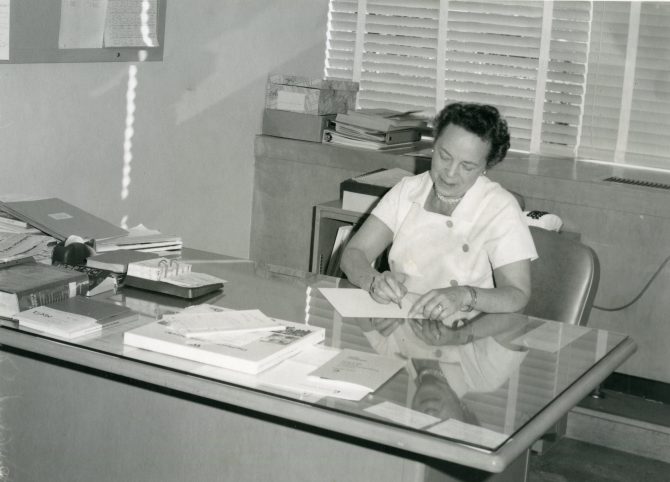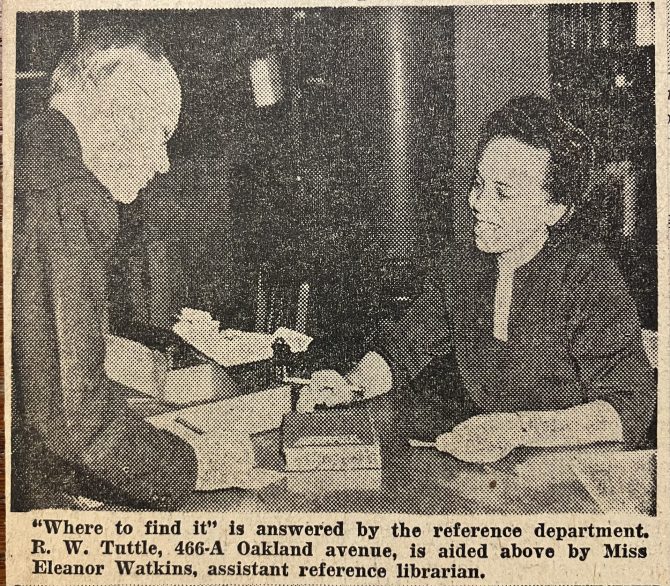Have you heard of Eleanor Watkins? I hadn't until Sean Dickerson, archivist at the African American Museum and Library (AAMLO) found a photograph of Eleanor Watkins in AAMLO's Royal Towns Papers with the caption "Oakland's first Black librarian." Sean asked if I could confirm the caption with documents in the Oakland Public Library Archives here in the Oakland History Center, and we both went on a quest to find out more.

Eleanor Watkins was a graduate of UC Berkeley's Library School in 1934, the same year she took a civil service test that made her eligible for employment at the Oakland Public Library. She was hired at OPL in 1935 as a Library Clerical Assistant, promoted by 1938 to the role of Junior Librarian, and promoted again to become an Assistant Reference Librarian in 1943.
Pioneer Urbanites : A Social and Cultural History of Black San Francisco by Douglas Henry Daniels describes how Eleanor Watkins was first hired by the library. Although she had one of the highest scores on the civil service exam, Watkins was passed over for employment because hiring managers were allowed to choose their favorite from a group of three top candidates. No one chose Mrs. Watkins, favoring lower-scoring white candidates in several rounds of hiring. When Watkins realized she was being treated unfairly she spoke to her mother, a businesswoman who had a client on the Library Board, about the situation. Her mother encouraged the client to speak up on Eleanor's behalf, which resulted in Watkins finally being selected for a position. Although she already had the degree that qualified her to work as a librarian, her initial lower-level position as a Library Clerical Assistant put her foot in the door as an internal candidate for future librarian positions. We're missing records for a few years, so we can't be sure exactly when she was promoted to a librarian position, but we know it happened by 1938.

The Oakland Tribune's "Activities Among Negroes" column on Feb 19, 1939 names Mrs. Eleanor Carroll Watkins as "the only woman of her race holding the position of a staff member of the institution in Alameda County." So it sounds like she was not only Oakland's first Black librarian, but possibly Alameda County's first Black librarian. We only have a little information about what Eleanor Watkins did in her career at OPL. In the 1939 column she was mentioned in recognition of her work on the library's Negro History Week programming, and a few memos in our library archives mention her work with the Oakland Council for Civic Unity. An Oakland Post-Enquirer photo essay on the Main Library from February 25, 1946 shows a photo of Watkins answering a patron's questions at the reference desk. We have records showing she was working at OPL through 1946, but after that we lose the thread. We don't have a record of her leaving OPL, but we found her again at Contra Costa County's Martinez Library in 1957, and acting as head librarian at a library in Point Richmond in 1970. She retired sometime in the 1970s and passed away in May of 1981.
Until Sean found the photograph at AAMLO, we didn't have any documentation commemorating Eleanor Watkins as Oakland's first Black librarian in our Library Archives. While I was searching I did find mentions of others who were described as Oakland's first Black librarian. Although we have pretty solid evidence that Eleanor Watkins was, really and truly, the first, no one is necessarily trying to steal her glory by giving that honor to someone else instead.
So let's not stop at Eleanor Watkins. Have you heard of Syria Baptiste? Baptiste was, we think, Oakland Public Library's second Black librarian, hired in 1944. Baptiste's obituary, however, said she was OPL's first Black librarian. The fact that Baptiste's family, who likely wrote her obituary, remembered her as Oakland's First Black Librarian is significant because it tells us something about her work life. What must it have been like to join the staff, when there was only one other Black librarian? Baptiste and Watkins were both at the Main Library, but maybe they didn't work closely together, maybe they didn't get along, or maybe they depended on one another to get through each day. No matter what their personal interactions were like, it probably felt lonely to be one of two Black librarians in a staff of dozens.
What about Annye Penn Roberson? Roberson was Oakland Public Library's first Black Senior Librarian, starting in 1946.
We can add qualifiers - the first Black Librarian at a certain branch, the first Black children's librarian, etc., etc. - that would give us a longer list of people who deserve to be celebrated for their achievements.
Black History Month can sometimes feel like a flood of "firsts." I think it's important to recognize those who were the first to do something, but we can miss a lot if we don't also celebrate those who came after. Being first may clear the path for others, or it may not. The second person to achieve something isn't necessarily any less brave, any less exceptional, or any less worthy of celebration. In the case of Eleanor Watkins, it's clear she was good at her job. She was promoted several times and eventually took higher-level jobs in other library systems. It's also clear that her potential to be a great librarian wasn't enough to get her a job. Instead, she had to let her mother pull strings in order to have a chance to succeed.
Eleanor Watkins, Syria Baptiste, Annye Penn Roberson, and many others were trailblazers whether or not they were technically first. We're honored to keep their stories here in the Oakland Public Library Archives, and to share those stories with you.



Add a comment to: Oakland’s First Black Librarians